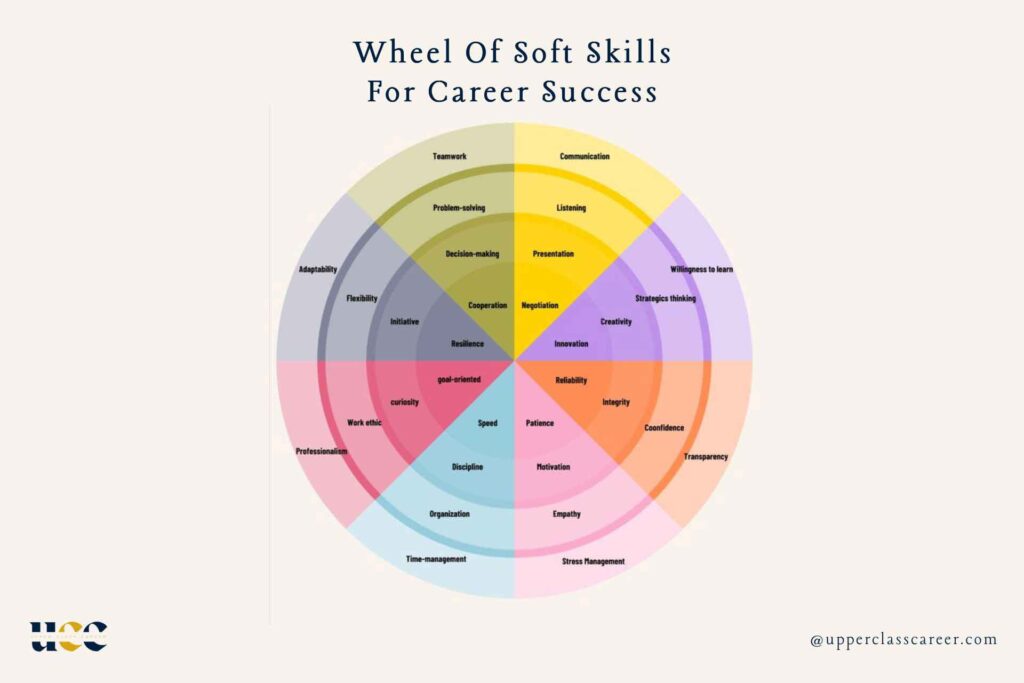Technical skills may help you qualify for a job, but soft skills determine how far you go. In today’s workplace, employers are no longer hiring based on knowledge alone. They are hiring for communication, adaptability, emotional intelligence, and the ability to work effectively with others under real pressure.
Soft skills influence performance, leadership potential, teamwork, and long-term career stability. They affect how you solve problems, manage time, handle feedback, and contribute to a healthy work environment. Unlike technical skills that change with tools and systems, soft skills remain relevant across roles, industries, and career stages.
This article covers 32 essential soft skills that add real professional value. Mastering these skills can improve employability, strengthen workplace relationships, and position you as someone companies trust, promote, and rely on.
32 Powerful Soft Skills To have For Career Success
A. Communication Skills: The Bedrock of Career Success
The foundation of any successful professional interaction is effective communication. Here’s a breakdown of the key communication skills crucial for career success:
1. Effective Communication: This involves conveying information clearly, concisely, and accurately, both verbally and in writing. Tailoring your communication style to your audience ensures your message resonates effectively.
2. Active Listening: It’s more than simply hearing what’s being said. Active listening involves paying close attention, understanding the speaker’s intent and emotions, and responding thoughtfully. This demonstrates respect, builds trust, and ensures everyone is on the same page.
3. Presentation Skills: The ability to confidently and persuasively present your ideas is essential for success in various situations like meetings, pitches, or training sessions. Honing your presentation skills ensures your message is impactful and engages your audience.
4. Negotiation Skills: Negotiation is a crucial element in securing deals, resolving conflicts, and achieving mutually beneficial outcomes. Effective negotiation involves understanding different perspectives, advocating for your position, and finding creative solutions that satisfy everyone involved.
By mastering these core communication skills, you’ll be well-equipped to navigate the complexities of professional communication. You’ll build stronger relationships, collaborate effectively, and confidently assert yourself in any situation. This, in turn, will lead to greater career advancement and success.

Also Read: 5 Secrets Experts Use To Articulate Their Thoughts Clearly
B. Collaborative Skills: The Power of Teamwork
Collaboration is highly valued in today’s workplace. Success is increasingly dependent on the ability to collaborate effectively with others. Here’s a closer look at the key collaborative skills that will make you a valuable team player:
5. Teamwork: This is the foundation of successful collaboration. It involves working cooperatively with others, leveraging individual strengths, and striving for a shared objective. Strong teamwork skills ensure everyone feels valued, ideas are heard, and the team moves forward in unison.
6. Problem-Solving: Effective teams encounter and overcome challenges together. Collaborative problem-solving involves actively listening to diverse perspectives, brainstorming creative solutions, and working together to reach the most effective outcome.
7. Decision-Making: Teams often face decisions that require collective input. Collaborative decision-making involves presenting and evaluating different options, respecting diverse viewpoints, and reaching a consensus that benefits the team as a whole.
8. Cooperation: Collaboration is built on cooperation. This means being willing to compromise, share resources, and prioritize the team’s success over individual agendas. A cooperative spirit fosters a positive and productive work environment where everyone feels supported.
C. Adaptability Skills: Thriving in a Dynamic Workplace
The world of work is constantly evolving. New technologies emerge, priorities shift, and unforeseen circumstances arise. Adaptability skills are crucial for navigating this dynamic landscape.
Here’s a breakdown of the key adaptability skills essential for career success:
9. Professionalism: This goes beyond technical skills and qualifications. Professionalism involves maintaining a positive attitude, demonstrating respect for colleagues, and upholding ethical conduct even when faced with change.
10. Work Ethic: A strong work ethic is the foundation of adaptability. It involves dedication, reliability, and a willingness to go the extra mile, especially when adjusting to new situations or processes.
11. Flexibility: The ability to be flexible is paramount. This means being open to new approaches, adapting to changing priorities, and embracing different work styles. A flexible mindset allows you to roll with the punches and contribute effectively even when things don’t go according to plan.
12. Adaptability: This skill involves readily embracing change and new information. It’s about being comfortable with the unknown, actively seeking out new learning opportunities, and readily adjusting your approach. An adaptable individual thrives in a dynamic environment and becomes a valuable asset during periods of transition.
By developing these adaptability skills, you’ll be well-equipped to handle change and uncertainty. You’ll be seen as a reliable and resourceful asset, capable of contributing effectively regardless of the circumstances. This agility will position you for success in a fast-paced and ever-evolving work environment.
D. Innovative Skills: Igniting Your Spark for Career Growth
Innovation is the lifeblood of progress. In today’s dynamic workplaces, the ability to generate fresh ideas and translate them into practical solutions is a key differentiator.
Here’s a breakdown of the core innovative skills that will make you a thought leader in your field:
13. Willingness to Learn: Innovation thrives on a constant influx of new knowledge. This involves staying abreast of industry trends, actively seeking out educational opportunities, and embracing challenges that stretch your skillset. A curious mind is always on the lookout for ways to improve and adapt, leading to groundbreaking ideas.
14. Strategic Thinking: Transforming innovative ideas into reality requires a strategic approach. This involves analyzing situations, identifying problems that need solving, and developing solutions that align with the organization’s long-term goals. Strategic thinkers can bridge the gap between creativity and practicality, ensuring innovative solutions benefit the business as a whole.
15. Creativity: The ability to think outside the box is essential for innovation. This involves approaching challenges from unconventional angles, questioning established methods, and proposing disruptive solutions. Creative problem solvers are not afraid to challenge the status quo and explore uncharted territories, leading to breakthroughs that move the needle.
16. Implementation Drive: Turning creative ideas into reality requires dedication and follow-through. This skill involves outlining practical steps, overcoming implementation hurdles, and measuring the impact of innovative solutions. Individuals with implementation drive are passionate about seeing their ideas come to life and actively work towards achieving tangible results.

Also Read: Best 10 Skills To Master To Get Noticed
E. Goal-Oriented Skills: Charting Your Course to Career Success
A successful career is built on a foundation of clear goals and the drive to achieve them. Here’s a breakdown of the key goal-oriented skills that will propel you towards career success:
17. Goal Setting: This skill forms the bedrock of goal orientation. It involves defining clear, measurable, attainable, relevant, and time-bound (SMART) goals that align with your overall career aspirations. Effective goal setting ensures you’re working towards a well-defined target and keeps you motivated on your journey.
18. Curiosity: A curious mind is a goal-oriented mind. Curiosity fuels your desire to learn, explore new possibilities, and push the boundaries of your capabilities. By continuously seeking knowledge and understanding, you’ll identify new opportunities and develop innovative strategies to achieve your goals.
19. Resilience: The road to success is rarely smooth. Resilience allows you to bounce back from setbacks, persist through challenges, and maintain your focus on long-term objectives. A resilient individual learns from setbacks, adapts their approach, and remains determined to achieve their goals.
20. Speed: Staying focused and managing your time effectively are crucial aspects of goal achievement. This involves prioritizing tasks strategically, minimizing distractions, and developing a strong work ethic to ensure you’re consistently making progress towards your goals.
F. Integrity Skills: Building Trust and Standing Out in Your Career
Individuals with strong integrity skills are highly sought after because they inspire trust, build strong relationships, and foster a positive work environment.
Here’s a closer look at the key integrity skills that will distinguish you in your career:
21. Reliability: Being reliable means consistently meeting commitments and following through on your promises. This includes adhering to deadlines, delivering high-quality work, and being accountable for your actions. A reliable individual inspires trust and confidence, making them a valuable asset to any team.
22. Honesty: Honesty is paramount in building and maintaining professional relationships. This involves being truthful in your communication, transparent in your actions, and acknowledging mistakes when they occur. Honest individuals are seen as trustworthy and dependable, fostering a more ethical and collaborative work environment.
23. Transparency: Transparency involves being open and forthcoming about your actions, decisions, and intentions. This allows for clear communication, fosters trust, and builds stronger relationships with colleagues. Individuals who operate with transparency demonstrate a commitment to ethical conduct and contribute to a more positive and collaborative work culture.
24. Accountability: Taking ownership of your actions and decisions is a core aspect of integrity. This involves owning up to mistakes, learning from them, and striving for continuous improvement. Accountable individuals are reliable and trustworthy, inspiring confidence and respect within their teams.
G. Organizational Skills: Mastering the Art of Efficiency:
Organizational skills encompass a range of abilities that allow you to manage your time effectively, prioritize tasks strategically, and maintain a clutter-free workspace.
Here’s a breakdown of the key organizational skills that will make you a master of efficiency:
25. Time Management: This skill forms the foundation of effective organization. It involves prioritizing tasks strategically, scheduling your time effectively, and minimizing distractions. Strong time management skills ensure you’re working on the most important tasks at the right time, leading to increased productivity and reduced stress.
26. Prioritization: Not all tasks are created equal. Prioritization involves identifying the most important and urgent tasks and allocating your time accordingly. This ensures you’re focusing your energy on activities that contribute most significantly to your goals.
27. Organization Systems: Developing effective organization systems is key to staying on top of your workload. This could involve using project management tools, creating to-do lists, or implementing a filing system that works for you. Having a clear system streamlines your workflow, reduces the risk of missed deadlines, and keeps you focused on achieving your objectives.
28. Stress Management: Feeling overwhelmed? Effective organization goes hand-in-hand with stress management. Learning to manage your workload effectively, delegate tasks when appropriate, and disconnect from work during designated times can significantly reduce stress levels. A calm and organized mind is better equipped to make sound decisions and navigate challenges effectively.
H. Interpersonal Skills: The Cornerstone of Collaborative Success
Interpersonal skills encompass a range of abilities that allow you to build strong relationships, foster collaboration, and navigate professional interactions with emotional intelligence.
Here’s a breakdown of the key interpersonal skills that will make you a master of collaboration:
29. Empathy: Understanding and acknowledging the feelings of others is crucial for building strong bonds. This involves actively listening to different perspectives, demonstrating genuine concern for colleagues’ well-being, and showing respect for their experiences. An empathetic individual fosters an inclusive and supportive work environment where everyone feels valued and heard.
30. Motivation: Enthusiasm is a powerful force. The ability to inspire and motivate yourself and those around you is a valuable asset in the workplace. This involves setting a positive example, celebrating achievements, and offering encouragement when facing challenges. Motivated individuals create a more vibrant and productive work environment, leading to increased team morale and overall success.
31. Patience: Effective collaboration thrives on patience. This involves maintaining composure under pressure, communicating clearly even during disagreements, and allowing colleagues time to process information or complete tasks. A patient individual fosters an environment where open communication thrives and conflicts are resolved constructively, leading to better outcomes.
32. Initiative: Taking initiative demonstrates proactiveness and dedication. This involves identifying opportunities to contribute, proposing solutions to problems, and actively seeking ways to improve processes. Individuals who take initiative are seen as resourceful and dependable, making them valuable assets within any team.
The job market is no longer a one-dimensional landscape. Technical skills, while essential, are only a piece of the puzzle. In today’s dynamic environment, employers seek well-rounded individuals with a potent blend of hard and soft skills. By honing the 32 skills outlined in this article, you’ll equip yourself to thrive in a competitive landscape.



